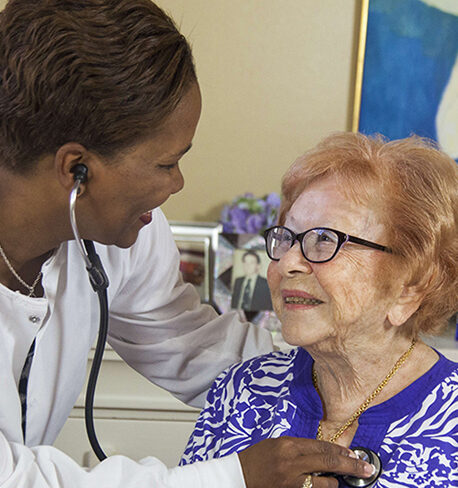Not every physician is comfortable caring for older adults. Some just don’t have the experience necessary to identify and address age-related health changes and concerns. If you or a senior you love aren’t happy with your primary care physician, it might be time to begin the search for a new doctor.
Finding a physician who can help manage current and future challenges is important to aging well. We’ve pulled together a few tips for helping you make an informed decision when it comes time to choose a new physician.
5 Tips for Choosing a Senior-Friendly Primary Care Physician
- Insurance network: The first step in your search is to identify which physicians accept your senior loved one’s health insurance. While you might think all physicians accept Medicare, a growing number of doctors are declining to work with Medicare and Medicaid due to perceived low reimbursement rates. Your preferred hospital or your insurance company might be able to help you identify physicians who are accepting new patients. Medicare will also create a list of doctors near you who accept new patients. Call 1-800-633-4227 for assistance. (TTY users can call 1-877-486-2048.)
- Ask friends for referrals: Word-of-mouth is important when it comes to finding a physician to entrust with an older family member’s care. Ask around to see who friends, family, and work colleagues know and trust. They may be able to provide you with valuable insight on what it’s really like to be a patient of a physician you are considering.
- Read the reviews: While reviews for physicians aren’t as plentiful as those created for other types of services, there are a few physician review sites you should visit online. Healthgrades and Vitals are two. Medicare’s Physician Compare is another useful tool.
- Location and office hours: Older adults who have restricted their driving or those who rely on others for transportation might place a high priority on office hours and location. Finding a physician with an office nearby and evening or Saturday hours is important.
- Schedule a visit: The next step is to meet the physician in person. While not all physicians offer this service, it’s worth calling to check and see if the doctor you are considering schedules in-person meetings with potential new patients.
Other Factors to Consider in the Search for a Physician
Finally, there are a few non-traditional options to take in to consideration:
- Visiting physician networks: A trend that continues to gain in popularity is visiting physician networks. Seniors who enroll with one of these organizations will have a physician visit them in the privacy of their own home. This applies to both routine health checks and to sick visits.
- Virtual physician visits: Some physician groups and insurance companies have teamed up to offer virtual office visit. Patients and their physician connect via video chat services online. For an older adult, this service can be very helpful.
We hope these tips help your family connect with a physician you feel confident in.
To keep learning more about caregiving, successful aging, senior living, and more, we encourage you to bookmark the Five Star Senior Living blog and stop back often.

